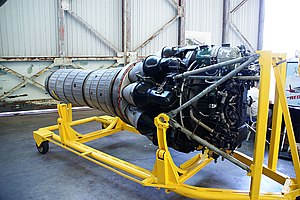Klimov RD-45
| VK-1 | |
|---|---|
 |
|
| Type | Turbojet |
| Manufacturer | Klimov |
| First run | 1947 |
| Major applications |
Mikoyan-Gurevich MiG-15 Ilyushin Il-28 |
| Developed from | Rolls-Royce Nene |
The Klimov VK-1 was the first Soviet jet engine to see significant production. It was developed by Vladimir Yakovlevich Klimov and first produced by the GAZ 116 works. Derived from the Rolls-Royce Nene, the engine was also built under license in China as the Wopen WP-5.
Immediately after World War II, the Soviet Union manufactured copies of first generation German Junkers 004 and BMW 003 engines, which were advanced designs with poor durability, limited by Germany's availability of rare metals at wartime. However, in 1946, before the Cold War had really begun, the new British Labour government under the Prime Minister, Clement Attlee, keen to improve diplomatic relations with the Soviet Union, authorised Rolls-Royce to export 40 Rolls-Royce Nene centrifugal flow turbojet engines. In 1958 it was discovered during a visit to Beijing by Whitney Straight, then deputy chairman of Rolls-Royce, that this engine had been copied without license to power the MiG-15 'Fagot', first as the RD-45, and after initial problems of metallurgy forced the Soviet engineers to develop a slightly redesigned (and metallurgically closer) copy, the engine had then entered production as the Klimov VK-1 (Rolls-Royce later attempted to claim £207m in license fees, without success).
The RD-45 was further improved to produce the VK-1, which differed from the Nene in having larger combustion chambers, larger turbine, and revised greater airflow through the engine, raised from the 41 kg/s for the Nene, to 45 kg/s. The VK-1F added the afterburner.
...
Wikipedia
